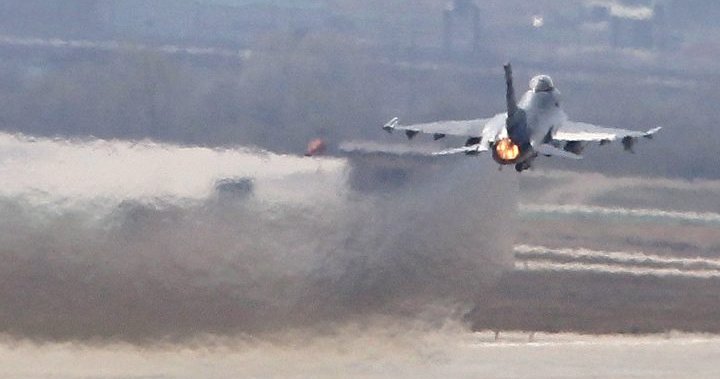
U.S. sending F-16s to Strait of Hormuz to protect ships from Iranian seizure
Global News
An official said the U.S. will send F-16 fighter jets to the Gulf region this weekend to augment the A-10 attack aircraft that have been patrolling there for more than a week.
The U.S. is beefing up its use of fighter jets around the strategic Strait of Hormuz to protect ships from Iranian seizures, a senior defense official said Friday, adding that the U.S. is increasingly concerned about the growing ties between Iran, Russia and Syria across the Middle East.
Speaking to Pentagon reporters, the official said the U.S. will send F-16 fighter jets to the Gulf region this weekend to augment the A-10 attack aircraft that have been patrolling there for more than a week. The move comes after Iran tried to seize two oil tankers near the strait last week, opening fire on one of them.
The defense official, who spoke on condition of anonymity to provide details of military operations in the region, said the F-16s will give air cover to the ships moving through the waterway and increase the military’s visibility in the area, as a deterrent to Iran.
The U.S. Navy said in both instances the Iranian naval vessels backed off when the USS McFaul, a guided-missile destroyer, arrived on the scene.
In addition, the defense official told reporters the U.S. is considering a number of military options to address increasing Russian aggression in the skies over Syria, which complicated efforts to strike an Islamic State group leader last weekend. The official declined to detail the options, but said the U.S. will not cede any territory and will continue to fly in the western part of the country on anti-Islamic State missions.
The Russian military activity, which has increased in frequency and aggression since March, stems from growing cooperation and coordination between Moscow, Tehran and the Syrian government to try to pressure the U.S. to leave Syria, the official said.
The official said Russia is beholden to Iran for its support in the war in Ukraine, and Tehran wants the U.S. out of Syria so it can more easily move lethal aid to Lebanese Hezbollah and threaten Israel. The U.S. has seen more cooperation, collaboration, planning and intelligence sharing, largely between mid-level Russian and Iranian Quds force leaders in Syria, to pressure the U.S. to remove troops from Syria, the official added.
There are about 900 U.S. forces in the country, and others move in and out to conduct missions targeting Islamic State group militants.











